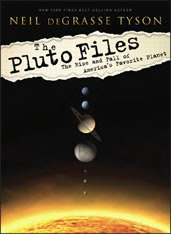The Pluto Files

Neil deGrasse Tyson is an astrophysicist by profession, but a stand-up comedian at heart. He's a frequent guest on late-night talk shows, and I recently caught him on C-SPAN giving a talk about his recent book, The Pluto Files, in which he appeared to be a combination of Carl Sagan and Henny Youngman.
Tyson's book is decidedly for general audiences, and that's fine by me, as I have an interest in astronomy but not in math. It's a breezy account of how the celestial object previously considered the solar system's ninth planet was "demoted" to the category of "dwarf planet," in which Tyson was seen by many as a villain.
Tyson is the director of the Hayden Planetarium in New York, and when they opened an exhibit on the solar system they grouped objects by categories other than the normal nine planets--terrestrial planets (Mercury, Venus, Earth, Mars), asteroids, gas giants (Jupiter, Saturn, Uranus and Neptune), and those in the Kuiper Belt, which include Pluto. A few people noticed this ("Where's Pluto?") but it wasn't until the New York Times published a front-page article titled "Pluto Not a Planet? Only in New York" that Tyson's world was turned upside-down.
There was a huge uproar in the scientific community as well as the general public. Tyson breaks down the reasons why: Pluto was discovered in 1930 by an American astronomer (Clyde Tombaugh), the only planet with that designation, and the same year Walt Disney named Mickey Mouse's dog Pluto, significantly lightening the real derivation of the name, which was the Roman god of the underworld. Pluto, over the years, had become American's favorite planet for sentimental reasons. Also, surprisingly for scientists, there was a "don't change it" attitude. For seventy plus years schoolchildren have been taught that there are nine planets, and many learned their names via a mnemonic (the one I learned was "My Very Educated Mother Just Sat Upon Nine Pins"). For astrophysicists to suddenly declare that the mnemonic is now wrong rubbed people the wrong way.
Tyson lays out the reasoning why the evidence is for a change in Pluto's category. By volume, it's more than half ice. It's orbit is elliptical rather than circular, and it's seventeen degrees off the plane of orbit of the other planets. Other planets have been demoted--when objects between Mars and Jupiter were discovered (most notably Ceres) they were initially called planets, and in the early 1800s there were up to 29 of them. These were reclassified as asteroids. Finally, in the last few years object in Pluto's orbit have been discovered, including a body called Eris that is actually larger than Pluto. Either planets had to be added or the whole definition of planet had to changed.
And that's what happened. A planet, which hadn't been defined since ancient Greece, is now defined as a body that orbits the sun (and not another planet, which is a moon), is round due to its gravitational pull, and bad news for Pluto, dominated it's own orbit. Since Pluto is one of several objects in it's orbit (which is collectively known as the Kuiper Belt), it got demoted to a new category: dwarf planet.
There are still those who disagree, but as time has gone on Tyson has gotten less hate mail. He seems to have eternal good humor about it, and glories in the letters he has received from kids, either pro or con. He also takes amusing digressions, such as in the Disney universe, how is it possible for a mouse to have a pet dog, and why can Goofy talk but Pluto can't?
This is a pleasure to read for non-experts (and for those who are experts it still is probably good for some yuks). I read it in two days, as it's full of cartoons and song lyrics (several singers penned songs about the issue) and other graphics. It's a must for amateur astronomers.


Tyson has also distanced himself from the controversial IAU demotion, which was done by only four percent of its membership, most of whom are not planetary scientists, referring to that decision as flawed. He is now saying that maybe it is too soon to define the term planet since we are discovering such a diversity of objects in this solar system and others.
ReplyDeletePlease do not blindly accept the IAU definition as fact, when it is not. It was opposed by hundreds of professional astronomers led by Dr. Alan Stern, Prinicipal Investigator of NASA's New Horizons mission to Pluto. Stern and like-minded scientists support a broader planet definition that includes any non-self-luminous spheroidal body orbiting a star. The spherical part is important because when objects reach a certain size, they are pulled into a round shape by their own gravity. This is a characteristic of planets and not of shapeless asteroids.
The IAU decision makes no sense because it states that dwarf planets are not planets at all. If that were amended to establish dwarf planets as a subclass of planets, a lot of this controversy could be resolved. And what is the problem with having many planets in the solar system? There is no need to artificially limit the number for our own convenience.
Meanwhile, for a different perspective, I encourage you to read Dr. David Weintraub's "Is Pluto A Planet."
Mary's Very Eager Mother Just Served Us Nine Pizzas.
ReplyDeleteThanks for the tip, Laurel. I've checked the Weintraub book out of the library. I took a look at your profile and we have a lot in common!
ReplyDeleteGood for you for checking out Weintraub's book! If you get a chance, feel welcome to visit my Pluto blog at http://laurele.livejournal.com
ReplyDelete